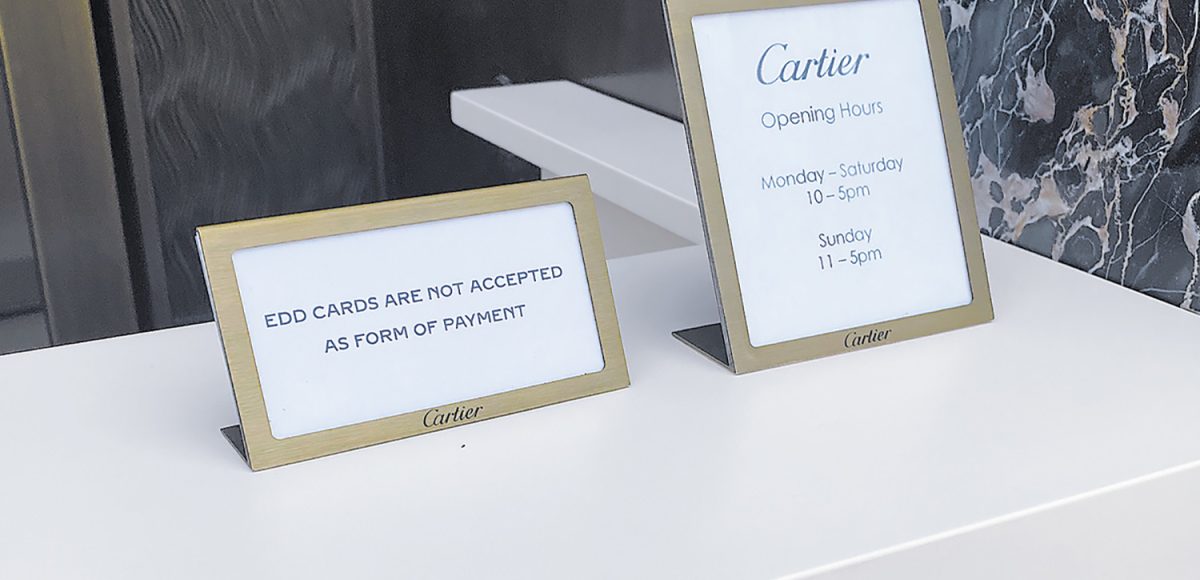The Beverly Hills Police Department (BHPD) arrested two men suspected of committing unemployment fraud and identity theft on June 18. The arrests come nearly a year since the department announced dozens of arrests for alleged unemployment fraud and, more recently, since state officials acknowledged lapses in preventing fraud. The suspects are Jaevon Hamilton, 23, and Ramanze Timothy Robinson, 20, both of whom have addresses in Chicago. They are both out on $250,000 bail.
Friday rush hour traffic through the Business Triangle was more congested than usual around 6 p.m. when a car parked itself in a red zone on Rodeo Drive and blocked traffic. Officers with the BHPD took notice and made contact with the occupants. “The occupants became angry and hostile towards officers,” Acting Captain Max Subin told the Courier. The officers called for backup.
With multiple squad cars on Rodeo Drive, officers detained the suspects and conducted a search. Subin said that the “field investigation” yielded several fraudulent unemployment insurance cards, “a large amount of U.S. currency, and several bags of recently purchased merchandise.”
In the latest economic downturn precipitated by the pandemic, California saw an unprecedented surge in unemployment claims. Between March 2020 and Jan. 16, 2021, the state processed 19.5 million claims, according to the Employment Development Department (EDD). For comparison, California processed 3.8 million at the height of the Great Recession in 2010.
But the state has also been coming to terms with an unseen level of EDD fraud. The department admitted in January that it may have paid out as much as $31 billion in fraudulent claims. At the same time, the department has come under fire for its backlog of claims, which currently sits at 222,000. Bank of America, which the state contracts with to distribute EDD cards, has also fielded criticism for its administration of the program. A class action lawsuit accuses the banking giant of negligence by failing to safeguard unemployment benefits and freezing hundreds of thousands of debit cards.
“EDD was clearly under-prepared for the type and magnitude of criminal attacks and the sheer quantity of claims,” said EDD Director Rita Saenz in a statement. “We are focused on making the changes necessary to provide benefits to eligible Californians as quickly as possible and stopping fraud before it enters the system.”
The department pointed out that 35 percent of unemployment applications nationally are fraudulent, according to security company ID.me. Between March 2020 and Jan. 16, 2021, California paid out $114 billion in unemployment benefits. The department said in January that around 10% of payments were made to fraudulent claims during that period and is investigating an additional 17% of payments.
Beverly Hills found itself at the center of the unfolding unemployment fraud story last September, when BHPD announced the arrests of 44 individuals suspected of EDD fraud. The announcement also made note of 129 allegedly fraudulent EDD cards worth more than $2.5 million, over $289,000 in currency, and seven handguns.
The department said it had learned earlier in the month that people were exploiting the state’s unemployment benefits by filing claims using stolen identities. The debit cards distributed in response to claims can have as much as $20,000 on them.
“Suspects have traveled primarily from out of state to obtain these fraudulent EDD cards in California,” BHPD said in a release. “The suspects will most often have numerous EDD cards in their possession with other people’s identities, along with large amounts of cash. They will then use the cards to lease short-term rentals, rent luxury vehicles, dine at restaurants and purchase high-end merchandise.”
Also, in September, BHPD officers arrested a Kentucky man outside of Cartier after confiscating two handguns and over $30,000 in cash found on his person. BHPD confirmed that the arrest was related to EDD fraud. The Courier obtained an exclusive video from the scene that captured the suspect repeating, “I’m not from here,” while officers seized cash and other alleged contraband.
Many retailers in the city began to restrict the use of EDD cards to purchase goods, some rejecting them outright. It is not clear what retailer Hamilton and Robinson purchased goods from.







